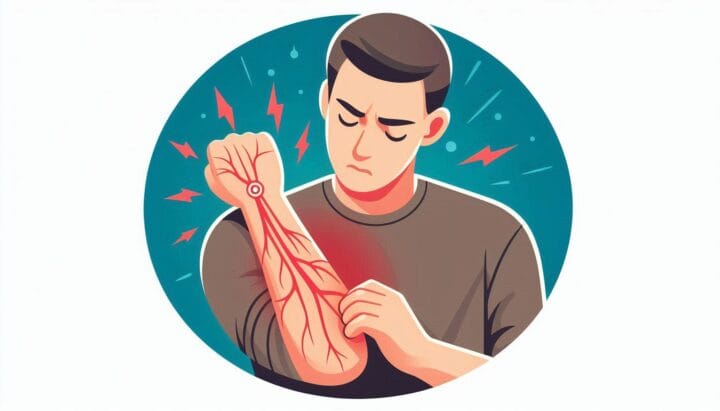Is Your Arm Pain from a Pinched Nerve? Signs to Watch For
Table of Contents

Is Your Arm Pain from a Pinched Nerve? Signs to Watch For
Is your arm giving you grief? Feeling like you’ve got a lightning bolt shooting through your limb? You might be dealing with a pinched nerve, but how can you tell? Let’s dive into the world of nerve pain and figure out if that ache in your arm is just a temporary nuisance or something that needs more attention.
The Pinched Nerve Predicament: More Than Just a Pain in the Arm
A pinched nerve isn’t just your average ache. It’s like your arm’s internal wiring got crossed, sending all sorts of wacky signals to your brain. But before we jump to conclusions, let’s break down what a pinched nerve actually is and how it might be causing your arm pain.
What’s a Pinched Nerve, Anyway?
Imagine your nerves as delicate electrical cables running through your body. Now picture one of these cables getting squeezed or pressed on by surrounding tissues – that’s essentially what a pinched nerve is. It can happen due to:
- Herniated disks in your neck
- Bone spurs
- Swollen tendons or ligaments
- Poor posture
- Repetitive motions
It’s like your body’s playing a game of Twister, but your nerves are losing.
The Telltale Signs: Is It Really a Pinched Nerve?
Now, you might be wondering, “How can I tell if my arm pain is caused by a pinched nerve?” Well, my friend, there are some key symptoms to watch out for. Let’s play detective and look for the clues:
1. The Tingling Tango: Pins and Needles Sensation
One of the most common signs of a pinched nerve is that infamous “pins and needles” feeling. It’s like your arm fell asleep at a party and is now trying to wake up. This sensation, also called paresthesia, can range from mildly annoying to downright uncomfortable.
2. Numbness: When Your Arm Goes MIA
If parts of your arm feel numb or like they’ve gone on vacation without you, it could be a sign of nerve compression. This numbness might come and go, or it could be constant, depending on the severity of the pinched nerve.
3. Radiating Pain: The Unwelcome Road Trip
Pinched nerve pain doesn’t always stay put. It likes to travel. You might feel pain that starts in your neck and radiates down your arm, or pain that shoots from your elbow to your fingers. It’s like your pain decided to go on a road trip through your arm.
4. Weakness: When Your Arm Throws in the Towel
If you’re suddenly fumbling with your coffee mug or struggling to open jars, a pinched nerve might be to blame. Nerve compression can lead to muscle weakness in the affected area. It’s like your arm decided to take an unscheduled day off.
5. The Position Puzzle: Pain That Changes with Movement
Pay attention to how your pain responds to different positions. Does it get worse when you turn your head a certain way? Does lying down make it better or worse? These clues can help pinpoint if a pinched nerve is the culprit.
The Imposters: When It’s Not a Pinched Nerve
Before we jump to conclusions, let’s consider some other conditions that might be masquerading as a pinched nerve:
1. Muscle Strain: The Overachiever’s Ailment
Sometimes, what feels like nerve pain is actually a good old-fashioned muscle strain. The key difference? Muscle pain usually feels more like a dull ache or soreness, while nerve pain tends to be sharper and more electric.
2. Tendinitis: The Repetitive Motion Rebel
If you’ve been overdoing it with repetitive motions (hello, tennis elbow!), you might be dealing with tendinitis rather than a pinched nerve. Tendinitis pain is usually more localized and worsens with specific movements.
3. Arthritis: The Joint Jammer
Arthritis can sometimes mimic the symptoms of a pinched nerve, especially in the neck or shoulder area. The main difference? Arthritis pain is often accompanied by joint stiffness and tends to be worse in the morning.
The Diagnosis Dilemma: When to Call in the Pros
While playing arm pain detective can be fun (okay, maybe not fun, but interesting), there comes a point when it’s time to call in the experts. Here’s when you should consider seeking medical help:
- Pain persists for more than a few days: If your arm pain is sticking around like an unwanted house guest, it’s time to get it checked out.
- Symptoms are severe or worsening: If your pain is getting worse or interfering with daily activities, don’t wait to seek help.
- You experience sudden weakness: If you suddenly can’t lift your arm or grip objects, it’s time for an urgent medical evaluation.
- Numbness or tingling won’t go away: Persistent numbness or tingling could indicate ongoing nerve compression that needs attention.
- You have other concerning symptoms: If your arm pain is accompanied by fever, unexplained weight loss, or other unusual symptoms, see a doctor promptly.
Remember, it’s always better to err on the side of caution when it comes to your health.
The Treatment Tango: Dancing Your Way to Relief
If it turns out you do have a pinched nerve, don’t despair. There are several treatment options available, depending on the severity of your condition:
1. Rest and Modify Activities
Sometimes, your arm just needs a vacation. Avoiding activities that aggravate your symptoms can give the nerve time to heal.
2. Physical Therapy: Your Arm’s Personal Trainer
A physical therapist can teach you exercises to stretch and strengthen the affected area. Think of it as sending your arm to the gym, but with a very specific workout plan.
3. Medications: Chemical Peacekeepers
Over-the-counter pain relievers can help manage mild pain. For more severe cases, your doctor might prescribe:
- Anti-inflammatory drugs to reduce swelling
- Nerve pain medications
- Muscle relaxants
4. Ergonomic Adjustments: Redesigning Your World
Simple changes to your workspace or daily habits can make a big difference. Proper posture, ergonomic equipment, and frequent breaks can help prevent nerve compression.
5. Surgery: The Last Resort
In severe cases that don’t respond to other treatments, surgery might be considered. This could involve releasing a compressed nerve or removing material that’s pressing on the nerve.
Prevention: Keeping Your Nerves Happy
An ounce of prevention is worth a pound of cure, especially when it comes to pinched nerves. Here are some tips to keep your arm nerves singing a happy tune:
- Practice Good Posture: Keep your head up, shoulders back, and arms relaxed.
- Take Frequent Breaks: If you’re doing repetitive tasks, give your arms regular rest periods.
- Stay Active: Regular exercise helps maintain flexibility and strength.
- Maintain a Healthy Weight: Extra pounds can put pressure on nerves.
- Listen to Your Body: If something hurts, don’t push through the pain.
Conclusion: Arming Yourself with Knowledge
Figuring out if your arm pain is caused by a pinched nerve can feel like solving a complex puzzle. But armed with the right information, you’re better equipped to identify the signs and take appropriate action.
Remember, while many cases of pinched nerves can be managed with conservative treatments, persistent or severe symptoms warrant medical attention. Don’t let arm pain keep you from living your best life. Whether it’s through lifestyle changes, medical treatments, or a combination of both, there’s hope for relief.
Ready to take the first step towards arm comfort? Start by paying close attention to your symptoms and implementing some of the prevention strategies mentioned above. And if your pain persists or worsens, don’t hesitate to reach out to a healthcare professional. Your journey to happier, healthier arms starts now!
FAQs
- Can a pinched nerve in my neck cause pain in my arm?
Yes, absolutely. This condition is called cervical radiculopathy. When a nerve root in your neck is compressed or irritated, it can cause pain, numbness, or tingling that radiates down your arm. - How long does it typically take for a pinched nerve in the arm to heal?
The healing time can vary greatly depending on the severity of the nerve compression and the underlying cause. Mild cases might resolve in a few days to weeks with proper care, while more severe cases could take several weeks to months. If symptoms persist beyond a few weeks, it’s important to consult a healthcare professional. - Can stress make pinched nerve symptoms worse?
While stress doesn’t directly cause pinched nerves, it can exacerbate symptoms. Stress often leads to muscle tension, which can increase pressure on nerves. Additionally, stress can lower your pain threshold, making existing symptoms feel more intense. - Are there any exercises I can do at home to relieve pinched nerve pain in my arm?
Yes, gentle stretches and exercises can often help. Some examples include neck tilts, shoulder rolls, and wrist flexor stretches. However, it’s crucial to consult with a healthcare professional or physical therapist before starting any exercise regimen to ensure you’re doing exercises that help rather than harm. - Can poor sleeping positions contribute to pinched nerves in the arm?
Absolutely. Sleeping in positions that put pressure on your nerves or cause your neck to bend at an awkward angle can lead to or exacerbate pinched nerves. Try to sleep on your back with a supportive pillow, or on your side with a pillow between your knees to maintain proper alignment.














Post Comment